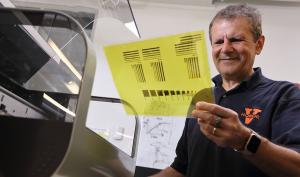
Computer coding touches most aspects of our modern lives, from the smartphones and laptops we carry daily to complex scientific advances like space exploration. While coding is often used to manage data transmission and storage, error detection and information security, one University of Virginia professor developed a groundbreaking application nearly three decades ago that became integral to modern computer memory solutions.
Mircea R. Stan, Virginia Microelectronics Consortium Professor of Electrical and Computer Engineering, first-authored a paper that introduced a coding method that reduces power consumption in electronics. Stan and his co-author, Wayne P. Burleson, received the 2024 A. Richard Newton Technical Impact Award for this seminal contribution to coding for low-power design.
The paper, published in 1995, outlined the Bus-Invert method, a coding technique that helps computers decide whether inverting data would save energy. Stan and Burleson were the first to propose a way to encode data such that power consumption is reduced, sometimes by up to 50%.
“Sometimes such simple ideas, obvious in retrospect, have the highest impact because they are easy to adopt and to implement in practice,” said Stan.
Stan and Burleson’s paper currently has nearly 1500 citations on Google Scholar and over 300 references in patents by top tech companies such as Intel, Samsung, Qualcomm and IBM. The Bus-Invert method is now a feature of modern computer memory solutions and part of the Joint Electron Device Engineering Council’s memory standards.
The A. Richard Newton Technical Impact Award is bestowed by the IEEE Council on Electronic Design Automation and recognizes outstanding technical contributions within the scope of electronic design automation, as evidenced by a paper published at least 10 years before the award.